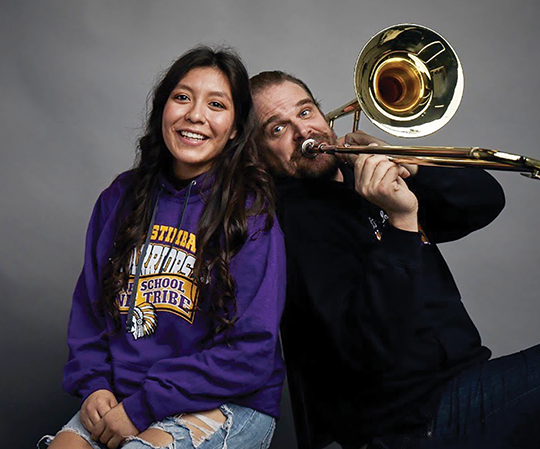Dr. Sam Romeo has come a long way from his childhood on a brush-scrubbed ranch in northeastern Nevada.
His office in the Tower Health and Wellness Center in Turlock is perfectly placed to catch the shifting sunlight as it travels across the horizon. The three large circular windows and corner position belie his status as president and CEO of the center.
But he is not one to fawn over his accomplishments, and deference and diffidence are just a part of his character as his altruism.
“I’m a country kid from Nevada,” he says. “I didn’t have electricity or plumbing until I was 16.”
He didn’t see his early years as deprived or deficient in any way. That’s simply the way life was.
His parents’ education didn’t go past high school, but his mother did have some nursing training and his father worked as a welder in addition to maintaining their land.
When Romeo was a boy, his dad started going on visits with a veterinarian friend of his, who was the only one in the northeastern part of the state. His dad, Romeo says, was “very bright, inventive,” and despite never attending college, he learned how to care for the animals. When his friend died, he had given Sam’s father his veterinary books, and soon he became the resident vet.
A young Sam got his introduction to medicine while on those trips around the county, and it was then that a passion for medicine developed.
The practices in those days could be seen as brutal and archaic now, he admits, but when he assisted with procedures like castration, wattling, dehorning and vaccination, he didn’t think twice about it.
His father died when he was six, but the seed had been planted and it set him on a lifelong journey that would take him all over the world.
Growing up on the high desert in Ely, Nevada, however, the career paths usually led to either the copper mines, the mills or the myriad other industrial jobs.
“The education back then was, in many ways, inadequate. So when I went to college I had a way to climb. But I did what I had to do and got into med school,” he says.
While he was at St. Mary’s College he met his future wife Patricia, who was attending Dominican University in San Rafael. They fell in love and in 1961, they married. In the span of five years, they had five children, and Romeo found himself struggling to pay for it all.
Patty cleaned houses and Sam did the painting and gardening. He lived on loans, which helped fill some gaps. Still, the bills continued to mount, and Sam soon had to apply for aid. He stood out in the welfare line, his white coat in stark contrast to the rest of the crowd.
“I couldn’t afford to feed my kids. There were a lot of chicken pot pies and rice, but we got through it.”
Even though times were rough, he “never felt that finance was a reason to do or not to do anything.” The lack of sufficient income didn’t deter him one bit. He insists the solution was simple, saying “You did what you wanted to do and you figured out how to pay for it.”
When he was a senior in college, he decided to join the Navy. He spent seven years in the service, did his medical training there, and even rose to the rank of Commander.
It wasn’t long before Romeo, now with six children and a MD from St. Louis University, began his upward movement through the medical field.
His current resume reads like a short novel, and in his 77 years he’s racked up some accolades: Senior Associate Dean for Clinical Affairs at USC, Clinical Instructor at the Department of Nursing for Idaho State University, medical director for countless health departments and universities. He was also runner-up for the National Family Doctor of the Year award given by Good Housekeeping Magazine and the American Academy of Family Physicians in 1977.
He’s even written a book called “We the Patients: How America’s Health Care System Was Hijacked and What We Must Do to Reclaim the Soul of Medicine,” which attempts to deconstruct the decline of the American health care system and offers ideas on how to turn it around.
But perhaps one of his greatest achievements is the fact that all of his children are accomplished. Five of them are doctors (four of whom work in the Tower Center), and one is a social worker.
Because of his humble nature, he refuses to admit much of a hand in their success, saying “That’s gotta be a credit more to my wife than anything else.”
A shortage of physicians brought some of his children and grandchildren to Turlock, and pretty soon nearly all of them, including Romeo, had converged on the town.
Romeo loves it at the Tower, where he’s been since it opened in 2005, but when he’s not in his office he exercises his creativity with woodworking, something he’s been doing about 30 years. He’s made dozens of pieces for family and friends. They’re professional, symmetrical, polished, like something you’d see on a showroom floor. There are living room sets, dining room sets, bedroom sets, bassinets, chests of drawers, a dollhouse.
Much like his finished pieces, the doctor himself gets his own share of praise. Nearly everyone in the tower knows and respects him, affectionately referring to him as “Papa.”
In the corner of his office, a white board bears the scribbling of what looks like sentiments from his grandchildren. “You rock!” and “Best papa ever!” are written next to drawings of blooming flowers and stick figures.
Meanwhile, Romeo sits at his desk, abjectly enjoying the benefits of a life well lived.





